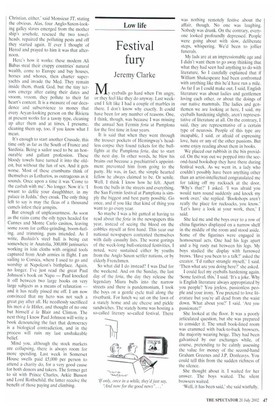Festival fury
Jeremy Clarke
My eyeballs go hard when I'm angry, or they feel like they do anyway. Last weekend I felt like I had a couple of marbles in there. I don't know why exactly. It could have been for any number of reasons. One, I think. though, was because I was missing the annual San Fermin feria at Pamplona for the first time in four years.
It is said that when they went through the trouser pockets of Hemingway's headless corpse they found tickets for the bullfights at the Pamplona feria, due to start the next day. In other words, he blew his brains out because a psychiatrist's appointment prevented him from going to the party. He was, in fact, the simple hearted fellow he always claimed to be. Or senile. Well. I think I know how he felt. Apart from the bulls in the streets and everything, the San Fermin festival at Pamplona is simply the biggest and best party possible. Go once, and if you like that kind of thing you want to go every year.
So maybe I was a bit gutted at having to read about the feria in the newspapers this year, instead of seeing the blood on the cobbles myself at first hand. This year our national newspapers contented themselves with daily casualty lists. The worst gorings of the week-long bull-oriented festivities, I noted, were sustained either by youths from the Anglo Saxon settler nations, or by elderly Frenchmen.
So what did I do instead? I was Dad for the weekend. And on the Sunday, the last day of the feria, the day they release the legendary Miura bulls into the narrow streets and there is pandemonium, I took the boys on a gentle cycle trail along the riverbank. For lunch we sat on the lawn of a stately home and ate cheese and pickle sandwiches. The stately home was hosting a so-called literary so-called festival, There was nothing remotely festive about the affair, though. No one was laughing. Nobody was drunk. On the contrary, everyone looked profoundly depressed. People were going about with slow, deliberate steps, whispering. We'd been to jollier funerals.
My lads are at an impressionable age and I didn't want them to go away thinking that what they had seen had anything to do with literature. So I carefully explained that if William Shakespeare had been confronted with anything like this he'd have run a mile. As far I as I could make out, I said, English literature was about ladies and gentlemen loving each other, or about the doings of our native mammals. The ladies and gentlemen we are looking at here, I said, my eyeballs hardening slightly, aren't representative of literature at all. On the contrary, I said, they are representative of a certain type of neurosis. People of this type are incapable, I said, or afraid of expressing love, hate or any of the other passions. But some enjoy reading about them in books.
We placed our rubbish in the bin provided. On the way out we popped into the second-hand bookshop they have there during festival week. As we went in, a lady who couldn't possibly have been anything other than an artist-intellectual congratulated me for taking off my rucksack at the door. 'Why's that?' I asked. 'I was afraid you would turn round suddenly and knock my work over,' she replied. 'Bookshops aren't really the place for rucksacks, you know.' 'Let's have a look at your work, then,' I said.
She led me and the boys over to a row of china figurines displayed on a narrow shelf in the middle of the room and stood aside. Some of the figurines were engaged in homosexual acts. One had his legs apart and a big rusty nut between his legs. My boys studied the display with furrowed brows. 'Have you been to a talk?' asked the creator. Td rather strangle myself,' I said. 'Then what are you doing here?' she asked.
I could feel my eyeballs hardening again. 'Some festival. this,' I said. 'It's a joke. Why is English literature always appropriated by you people? You joyless, passionless people and your irony. You pretend to love literature but you're all dead from the waist down. What about you?' I said. 'Are you passionate?'
She looked at the floor. It was a poorly articulated question, but she was prepared to consider it. The small book-lined room was crammed with back-to-back browsers, the majority wearing beige. They had been galvanised by our exchanges while, of course, pretending to be calmly assessing the value for money of the second-hand Graham Greenes and J.P. Donleavys. You could tell this from the sudden richness of the silence.
She thought about it. I waited for her answer. The boys waited. The silent browsers waited.
'Well, it has been said,' she said wistfully,


























































 Previous page
Previous page